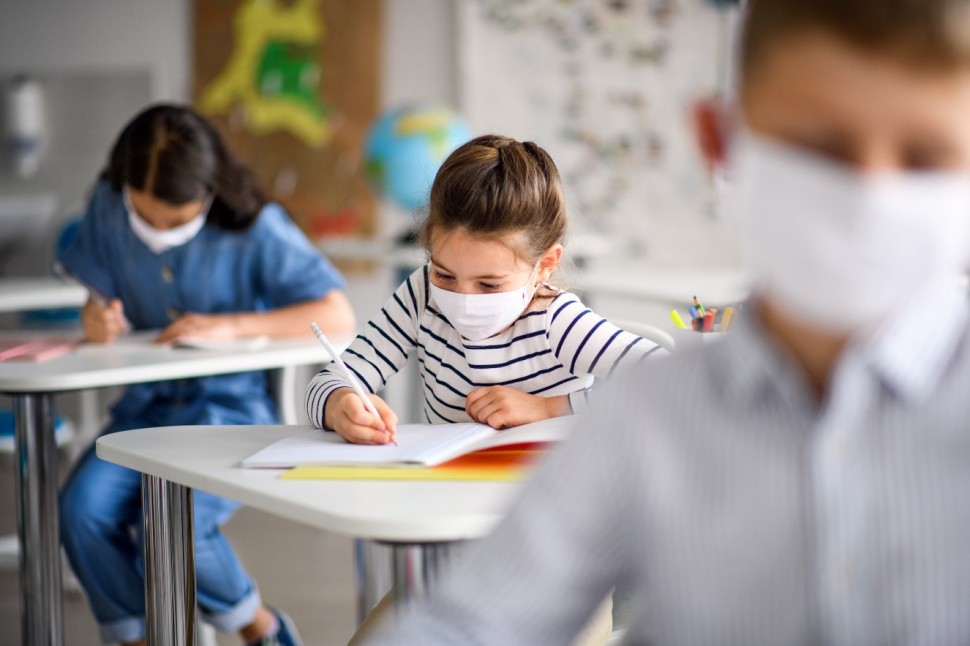According to the latest results from an ongoing national survey of attitudes about COVID-19, most Americans do not believe it is safe for K-12 students to return to in-person classes this fall. Only 31% of respondents believe that returning to school is very safe (10%) or somewhat safe (21%).
There are differences across groups of Americans, notably by gender and race. For instance, women are less likely to consider returning to school as very or somewhat safe (28% versus 34% for men), as are non-white respondents (19% versus 37% among white respondents).
In addition, the study found attitudes toward the safety of students returning varied greatly by income, with the wealthiest respondents (incomes over $200,000) almost twice as likely as the least wealthy respondents (incomes under $10,000) to express confidence in school safety (40% versus 22%).
The researchers, part of a consortium of four universities conducting “The COVID-19 Consortium for Understanding the Public’s Policy Preferences Across States,” which includes Northwestern, Harvard, Northeastern and Rutgers, also discovered state and partisan disparities in perceptions about school reopening safety.
“Clearly, Americans are concerned. That those with lower incomes exhibit less confidence may track resource differences between schools that are needed to return safely,” said James Druckman, the Payson S. Wild Professor of political science in the Weinberg College of Arts and Sciences at Northwestern and associate director of the University’s Institute for Policy Research.
The five states exhibiting the highest level of confidence are solid Republican-led states, while the five least confident states include two solidly Republican, and three (including the District of Columbia) are solidly Democratic.
Like many other responses to COVID-19, attitudes about school safety differ greatly by political affiliation.
Among those who identify as Republican, 53% believe it would be safe for K-12 students to return to school compared to 15% of Democrats and 28% of independents.
The survey found little variation between Republicans and independents with school-age children at home versus those without. More than half (52%) of Republican parents and 30% of politically independent parents see students returning to school as safe, compared to 54% and 28% of Republicans and independents without children.
However, Democrats with children at home are 8% more likely to believe school is safe than their counterparts without.
“The general partisan difference echo findings we have had in all of our surveys,” Druckman said. “That Democrats with children express more confidence may reflect hopeful projections, or, perhaps, more information about precautions being taken.”
Other key findings of the survey include:
- Perceived safety was impacted by media use. Among respondents who got pandemic news from Fox News in the last 24 hours, 41% believe schools are very or somewhat safe to reopen. Among respondents who cited CNN or MSNBC for pandemic news, 23% and 19% respectively, believed it was safe.
- Within all three partisan groups, watching Fox News as a source of information about COVID-19 is associated with a higher likelihood of believing it is safe for students to return to school than watching either CNN or MSNBC.
- Respondents who indicate that they trust President Trump to manage the COVID-19 crisis are far more likely to believe it is safe for students to return to school than their counterparts who do not (53% versus 16%). Similarly of those who plan to vote for Trump, 58% believe schools are safe versus 18% of those who do not plan to vote for Trump.
- Divisions over mask-wearing, covered in a previous report, are heavily influenced by partisanship, and strongly predict attitudes about the safety of students returning to school.Those who follow guidelines to wear masks outside the home are dramatically less likely to feel it is safe to reopen schools (27% versus 64%).
- There is little differentiation in the perception of school safety between parents with only young children in the home (28%) and their counterparts with preteen or teenage children (34% and 32% respectively).
- Attitudes toward school safety are only moderately related to the trend in local COVID-19 cases. About a third (36%) of respondents with fewer cases in their county than the median respondent say it is safe for K-12 students to return, compared to 27% of respondents living in counties with more cases than the median. There was a similar split by death rate, with 36% in counties with a lower-than-median death rate saying return is safe, compared to 29% for those in counties with higher death rates.
Read the current report here about perceptions of schools reopening safely in the U.S. as well as previous reports by the COVID-19 Consortium.


